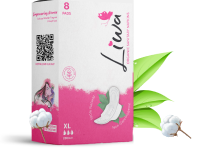Menstrual Hygiene Products: A Detailed Comparison
Choosing menstrual hygiene products can be overwhelming due to the many options available. A critical decision is whether to use organic or synthetic cotton pads. This comparison aims to help you make an informed choice.
Selecting between organic cotton sanitary pads and synthetic pads can be challenging. Since menstrual hygiene is critical to your overall health, making the right decision for your body is essential.
When choosing a pad, consider the materials used, how they affect your skin, environmental impact, comfort, and overall health implications.
While many people focus on shared factors when choosing menstrual products, the type of underwear you use is often overlooked. Using a pad during your period can be uncomfortable, so minimising additional irritation is essential. Organic cotton panties are a great option for increased airflow and comfort. They help manage moisture and reduce the risk of skin irritation and allergies.
Now, let’s look at the essential factors to consider when selecting menstrual pads:
Composition
- Organic Cotton Pads: These pads are made from 100% organic cotton and bamboo pulp, grown without chemicals. They are free from fragrances and dyes, making them a safe choice for sensitive skin and reducing the risk of rashes.
- Regular Synthetic Pads: In contrast, regular synthetic pads are usually made from rayon, polyester, and plastic. They may contain chemical adhesives, fragrances, and dyes, which can cause skin irritation or allergic reactions in some people.
Environmental Impact
- Organic Cotton Pads: Organic cotton pads are eco-friendly and biodegradable. They are made from cotton grown without harmful chemicals, which helps maintain healthier soil and water. These pads typically break down within 18-24 months in a composting facility. Proper disposal is still important to minimise environmental harm. Since organic cotton is biodegradable, it decomposes naturally and reduces long-lasting waste.
- Regular Pads: In contrast, regular pads made from synthetic materials have a significant environmental impact. They contribute to plastic waste in landfills and can take hundreds of years to decompose. The production of synthetic pads often involves fossil fuels and chemicals, further increasing their environmental footprint.
Comfort and Performance
- Organic Cotton Pads: Organic cotton pads are typically more comfortable to wear. They are breathable and less likely to irritate, allowing for better air circulation and reduced discomfort. Organic cotton is highly absorbent, effectively containing blood and providing reliable leak protection. These pads are designed to be leak-proof, making your period more hassle-free.
- Regular Pads: Regular pads often have a smoother texture but may not be as breathable as organic cotton pads. They can be less absorbent, potentially requiring more frequent changes and increasing the risk of leaks. Additionally, synthetic materials used in regular pads may cause skin irritation or rashes for some people.
Health Considerations
- Organic Cotton Pads: Organic cotton pads are ideal for sensitive skin or allergies. They help prevent skin irritation, rashes, and allergic reactions because they do not contain chemical adhesives, fragrances, or dyes. For long-term use, organic cotton pads are a safer choice.
- Regular Pads: Regular pads often contain chemicals that can harm the body. These chemicals and adhesives may cause skin irritation, rashes, or discomfort for some individuals.
Conclusion
In summary, organic cotton and regular synthetic pads serve the same function but have fundamental differences. Organic cotton pads are more sustainable, less likely to cause allergies, and better for the environment. On the other hand, regular pads are often less expensive. However, they can cause skin irritation and have a more significant environmental impact. Choosing the right pad is a personal decision, and selecting what feels most comfortable for you is essential. For more information, visit the Liwapads website.



